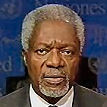| Outgoing UN Secretary-General Kofi Annan on Monday urged the US not to abandon "its own ideals and objectives" in the war against terrorism, stressing that "human rights and the rule of law are vital to global security and prosperity." In his last speech as secretary-general, delivered at the Truman Presidential Library in Missouri, Annan also pushed UN Security Council reform, saying that the body's membership "reflects the reality of 1945, not of today's world." During his remarks, Annan outlined five lessons he learned during his 10-year leadership of the United Nations, including "that both security and development ultimately depend on respect for human rights and the rule of law." Annan said: Although increasingly interdependent, our world continues to be divided "not only by economic differences, but also by religion and culture. That is not in itself a problem. Throughout history human life has been enriched by diversity, and different communities have learnt from each other. But if our different communities are to live together in peace we must stress also what unites us: our common humanity, and our shared belief that human dignity and rights should be protected by law. That is vital for development, too. Both foreign investors and a country's own citizens are more likely to engage in productive activity when their basic rights are protected and they can be confident of fair treatment under the law. And policies that genuinely favor economic development are much more likely to be adopted if the people most in need of development can make their voice heard. In short, human rights and the rule of law are vital to global security and prosperity. As Truman said, "We must, once and for all, prove by our acts conclusively that Right Has Might." That's why this country has historically been in the vanguard of the global human rights movement. But that lead can only be maintained if America remains true to its principles, including in the struggle against terrorism. When it appears to abandon its own ideals and objectives, its friends abroad are naturally troubled and confused. And states need to play by the rules towards each other, as well as towards their own citizens. That can sometimes be inconvenient, but ultimately what matters is not convenience. It is doing the right thing. No state can make its own actions legitimate in the eyes of others. When power, especially military force, is used, the world will consider it legitimate only when convinced that it is being used for the right purpose "for broadly shared aims" in accordance with broadly accepted norms. No community anywhere suffers from too much rule of law; many do suffer from too little" and the international community is among them. This we must change. The US has given the world an example of a democracy in which everyone, including the most powerful, is subject to legal restraint. Its current moment of world supremacy gives it a priceless opportunity to entrench the same principles at the global level. As Harry Truman said, "We all have to recognize, no matter how great our strength, that we must deny ourselves the license to do always as we please." |





